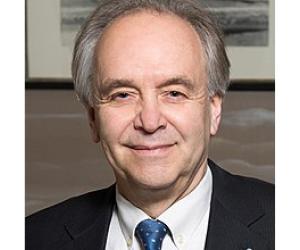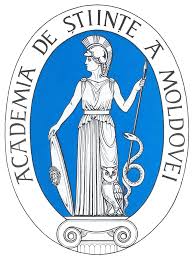- Views: 1329
Interview with Prof. Klaus Mainzer, President of the European Academy of Sciences and Arts, by Eugenia Tofan
1. Dear Prof. Klaus Mainzer, four years have already passed since the first interview, which I conducted in the context of your election as president of the European Academy of Sciences and Arts (AEȘA), based in Salzburg, Austria, one of the most prestigious European scientific forums. We are both happy and honored to know that, during these four years, you have developed a sustained collaboration with the Academy of Sciences of Moldova, implicitly, with the Moldovan scientific community. It is significant that this collaboration is crowned by your visit to our small but beautiful country or, as you yourself expressed, sometimes "small" also means "intelligent", and the Republic of Moldova is an eloquent example. To begin with, please share with us what feelings you came to the Republic of Moldova with?
As you know, I come from Germany. Germany is a comparatively large country in Europe. Recently, the German Chancellor visited Moldova to emphasise how important your country is for Europe. You combine East and West in your history, culture and religion. Moldova is therefore a country that is extremely important for building bridges between East and West, and the world situation has changed dramatically since our first interview. Today we live in a time of conflicts and wars, even in Europe. Scientists are not politicians. But with our scientific co-operation we can build bridges across all political boundaries. That's why I'm coming to Moldova with a lot of hope, but I'm also very curious about the country and its people.
2. With reference to the title of your lecture on artificial intelligence, which is as current as it is intriguing, I would like to return to an intention with great perspectives, voiced four years ago, in which you proposed to create a thematic network oriented towards the EU agenda with reference to digitalization, artificial intelligence, environment, climate, health etc., and thus to try to combine Europe's innovation power, technology and economic dynamism with the cultural and spiritual treasure of the old continent, or, this would also constitute the essential profile of EASA. What achievements could you mention in this context?
At the beginning of the new term of office, we started with a cross-class thematic network for the interdisciplinary focus areas of digitalisation/AI, energy/climate/environment and education/training for Europe. The results of these commissions were coordinated by Academy deans and summarised in official Academy white papers, which were certified by the Presidium and Senate. They were published in the newly founded Academy Proceedings (PEASA) and led to invitations to European and international institutions (e.g. European University Institute in Florence, Chinese Academy of Sciences). PEASA has now developed into an internationally highly qualified scientific journal.
Personally, I have always been in favour of Europe as an area of innovation that realises its technical and scientific potential on the market and combines it with its cultural tradition. However, due to the dramatic change in the political world situation and the markets in East and West, South and North, Europe must reorganise itself. Apart from the problems of energy supply, industry in some European countries (e.g. car manufacturing, steel) has come under pressure. The global markets are currently reorganising themselves with dramatic consequences for the labour market in Europe. This makes it all the more important to strengthen Europe's innovative power. Europe must become globally competitive again. Despite all the ‘artificial intelligence’ (AI): The greatest asset is the innovativeness and creativity of our people! Ultimately, this is a question of the quality of our education. As you can see, we have taken the pulse of the times four years later with the focus of our white papers in the thematic network.
3. Dear Professor Mainzer, since you are a humanist, how do we mix creative energies to be most useful to the future of humanity? And how true is this, not only for the academic world, but also for people outside the scientific field?
In my presentation, I showed how modern chatbots are also changing the humanities. ChatGPT can produce all kinds of texts and videos. In Hollywood, actors and scriptwriters recently went on strike because they are increasingly being replaced by AI systems in movies. In the current hybrid war, however, political elections can also be manipulated by AI. On the one hand, we therefore need to train AI systems as service providers for us humans. On the other hand, we also need to train human judgement so that the machines don't end up taking over, as the subtitle of one of my books says: ‘Artificial intelligence - when will the machines take over?’ (Springer 2nd edition 2019).
To raise our profile as an academy of science and the arts, the ‘Arts meets Science’ series of events was also introduced and organised by the deans of the arts, medicine and natural sciences. Every fortnight, an international audience gathers online and the president gives a short thematic introduction to the respective lectures, which illuminate a common topic from the artistic and scientific side. Moldova is cordially invited to participate.
4. And if we can keep the register in the chapter of artificial intelligence, and that's because, now, every human being is more and more interested in what it will bring us good for humanity and how we will "cohabit" with it. You, having as a field of research, in addition to artificial intelligence, also the paradigm of self-organization, and chaos theory, and logic, and cognitive science, but also being a faithful representative of the technical-scientific, i.e. intellectual, power, could you tell us if it is true that we will become useless with the "infiltration" of artificial intelligence into our lives? Because, in social circles, this is precisely what is being discussed acutely, or is it a matter of a lack of horizons?
We observe the self-organisation of new structures and patterns in complex systems in the natural and social sciences. Complexity research deals with the interdisciplinary question of how the interaction of many elements of a complex system (e.g. molecules in materials, cells in organisms or people in markets and organisations) can create order and structures, but also chaos and collapse. Complexity research aims to recognise trends, chaos, and conflicts in complex systems and to understand their causes in order to gain insights into new potential for shaping the systems. It is therefore about early warning systems in organisms, ecological systems, climate models and financial markets, for example.
However, the mass of data in these complex systems can only be handled by AI systems. Modern machine learning uses statistical learning algorithms that calculate expected probabilities for data patterns. To do this, the systems are trained using samples. In this sense, they learn ‘from experience’ to solve certain tasks better and better.
Unfortunately, however, they use computer hardware that is extremely energy-intensive. A large proportion of the world's energy will be used for digitalisation and AI in the future. This is not good news for all of us, but especially not for the Republic of Moldova, which is interested in digital progress, but also in energy efficiency. Compared to digital computers with machine learning, biological brains with ‘natural intelligence’ need incredibly little energy - just 20 watts. That's the energy of a small light bulb for all the amazing feats of the human mind.
My new book on new brain-orientated computer architectures (‘Artificial Intelligence of Neuromorphic Systems’, World Scientific Singapore 2024) is therefore about energy-efficient and therefore sustainable AI.
5. Thanking you for these exhaustive answers, I would like to return to the collaborative relations with the Academy of Sciences of Moldova. I would like to remind the general public that you have been very connected to the activity of our Academy, participating in many landmark events, with impactful public lectures, whether during the Science Week dedicated to the 60th anniversary of the Academy's founding, scientific conferences with themes of peace, either within the Summer Schools, etc. For the remarkable contributions mentioned, but also for other support given to Moldovan researchers, the management of AȘM awarded you the highest academic distinction - the "Dimitrie Cantemir" Medal. If we were to enter a slightly more sentimental register, because emotions are also part of the human and induce a state of affairs, what does this academic distinction mean to you?
Dimitrie Cantemir was a great polymath. When I read his biography, it immediately reminded me of the great German polymath Gottfried Wilhelm Leibniz. Leibniz was a mathematician and philosopher. Dimitrie Cantemir was a great linguist and polymath. Both are called polymaths because they not only had a great deal of specialised knowledge of their time, but also built up a large scientific network. This has motivated me throughout my life. That's why I feel very understood and honoured to receive this award. This kind of universal scholarship and scientific network is more relevant today than ever before. So we can start to build bridges again.
6. With what impressions do you leave the Republic of Moldova?
Gratitude and hope. On the last day of my stay, I had the opportunity to talk to your Minister of Culture, your Minister of Science and Research and some members of the Parliament of the Republic of Moldova. The idea came up to develop a future perspective in Moldova with AI in research, science and education, coordinated by the Moldavian Academy of Sciences.
It is an advantage that Moldova is a small country. I was able to experience how short and unbureaucratic the paths between the individual decision-makers are. Large countries and organisations are burdened by cumbersome decision-making processes and bureaucracy. This could lead to quick and efficient solutions in Moldova.
7. And because we are at the end of the year and we are only days away from the New Year, what message would you have for the academic body, but also for the scientific community here in the year of the snake?
In my speech when I was honoured with the Dimitrie Cantemir Medal, I had already proclaimed the message that the future of your country lies in education and training. Invest in the education and training of your young people! In the age of artificial intelligence, it is not the size of a country that matters, but the innovative power and creativity of its people. Invest in the ‘raw material spirit’ and keep your people, to build up this beautiful country! Then, you will be a very welcome partner in the European community which can help to build bridges between East and West.
Our technical, scientific and cultural societies are not only based on science and art. Science and art also open up the dialogue between East and West, North and South, with the hope of greater tolerance and peace in the world. Humanity has so many vital problems to solve for the future of our planet. That is why we can and must no longer tear ourselves apart, but must co-operate across all borders. The message for the coming up year of the snake: A snake is said to be smart and clever. We could learn from it.
Dear Mr. President, you have done us a great honor by granting us this rigorous interview, for which we express our full gratitude and hope that you will return to our small country.

